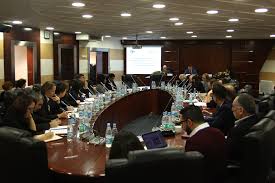Hotline: +381 61 63 84 071
Moscow conference on the best practices and challenges in refugee crisis

In October Moscow hosted the international conference titled Current system of international humanitarian aid: the best practices and challenges. Marijana Savic, Director of NGO Atina participated in the conference to share our experiences related to the work with women and girls refugees and migrants, as well as our attitude about the importance of gender sensitive approach in humanitarian work. The conference was organized by Moscow State University for Foreign Affairs (MGIMO) and Oxfam-Moscow with the aim to advance knowledge related to the mechanisms of humanitarian assistance. Particularly important topics were inequalities within the system of provision of humanitarian assistance, importance of international humanitarian law, how to include gender perspective in humanitarian response, responsibilities of the states to support locally-led, accountable, impartial and effective responses that save and protect lives and promote sustainable peace efforts.
The conference has gathered over 100 participants from nongovernmental sector, institutions and academia and it presents one of the first attempts to bring together international as well as national humanitarian experts in Russia with the aim to review current developments in humanitarian action, identify challenges and indicate best practices as a contribution to localization of the future Russian aid agenda. Russia is important international actor with resources and capacities to provide humanitarian assistance effectively and to form agenda on international, national and local levels. This conference is a step forward in establishing a dialogue and exchange of experiences between Russian governmental and non governmental aid stakeholders and international organizations that are the first to provide response to the crisis, experts working in the field and researchers introducing analytical aspect in the orbit of humanitarian aid.
Besides representative of NGO Atina that presented the experience of the work in Serbia, with emphasis on the necessity of gender approach, other participants were coming from Great Britain, Russia, Lebanon, USA, Columbia, Iraq, Yemen, Kyrgyzstan and Netherlands.












 FACEBOOK
FACEBOOK TWITTER
TWITTER YOUTUBE
YOUTUBE